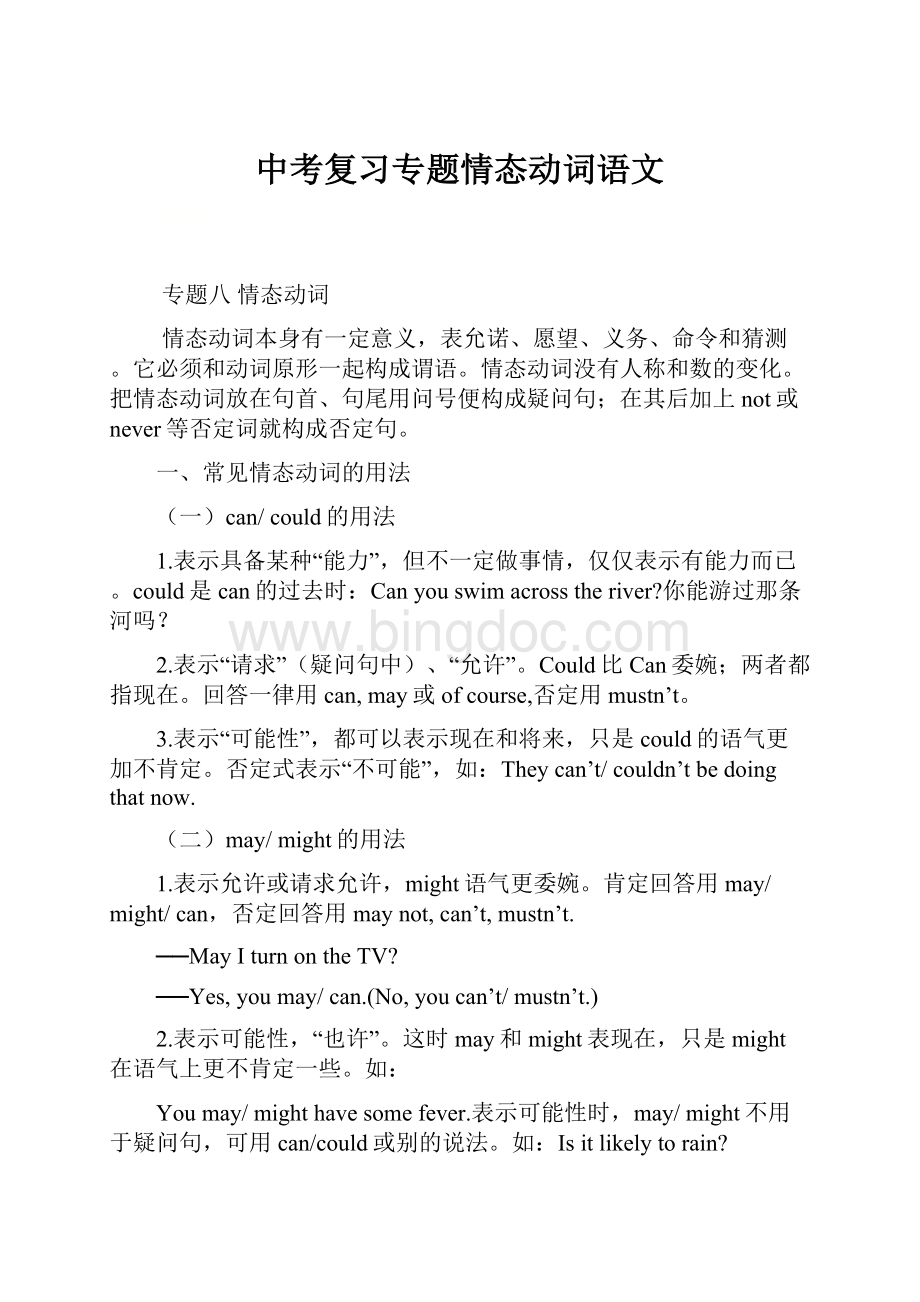中考复习专题情态动词语文.docx
《中考复习专题情态动词语文.docx》由会员分享,可在线阅读,更多相关《中考复习专题情态动词语文.docx(8页珍藏版)》请在冰点文库上搜索。

中考复习专题情态动词语文
专题八情态动词
情态动词本身有一定意义,表允诺、愿望、义务、命令和猜测。
它必须和动词原形一起构成谓语。
情态动词没有人称和数的变化。
把情态动词放在句首、句尾用问号便构成疑问句;在其后加上not或never等否定词就构成否定句。
一、常见情态动词的用法
(一)can/could的用法
1.表示具备某种“能力”,但不一定做事情,仅仅表示有能力而已。
could是can的过去时:
Canyouswimacrosstheriver?
你能游过那条河吗?
2.表示“请求”(疑问句中)、“允许”。
Could比Can委婉;两者都指现在。
回答一律用can,may或ofcourse,否定用mustn’t。
3.表示“可能性”,都可以表示现在和将来,只是could的语气更加不肯定。
否定式表示“不可能”,如:
Theycan’t/couldn’tbedoingthatnow.
(二)may/might的用法
1.表示允许或请求允许,might语气更委婉。
肯定回答用may/might/can,否定回答用maynot,can’t,mustn’t.
──MayIturnontheTV?
──Yes,youmay/can.(No,youcan’t/mustn’t.)
2.表示可能性,“也许”。
这时may和might表现在,只是might在语气上更不肯定一些。
如:
Youmay/mighthavesomefever.表示可能性时,may/might不用于疑问句,可用can/could或别的说法。
如:
Isitlikelytorain?
3.祈使句中表示祝愿:
Mayyousucceed!
(三)must的用法
1.表示义务、命令或劝告,“必须”。
Youmusttellmethetruth.你必须和我说实话。
在回答由must引起的问题时,否定回答用needn’t或don’thaveto,表示“不必、没必要”;而mustn’t表示“不准许”的意思。
──Musttheladiesweardresses?
──No,theydon’thaveto/theyneedn’t.
2.表示推测,“肯定”。
此时,must只用于肯定句。
在否定句或疑问句中,用can/could:
Theremustbeamistake.Can/Couldtherebeamistake?
(四)need和dare的用法
情态动词need“需要”和dare“敢”通常只用于否定句和疑问句中。
Youneednotcomesoearly.Howdareyoubesorude?
但need和dare可作为实义动词,后跟动词不定式,可用在所有句型中,注意此时他们的否定式和疑问式与情态动词不同。
(五)shall和will的用法
1.shall用在第一、三人称作主语的疑问句中,来征求意见。
ShallIgonow?
Shallweinviteher,too?
2.shall用于所有人称,表示说话人的决心、保证、许诺、威胁、警告、命令等强烈的感情,如:
Youshallhaveananswerbytomorrow.Heshallsufferforthis.
3.will可以表示“愿意、肯、会、固执”等意义,而非将来,would则更婉转:
Iwillpayforit.We’regoingonaclimbingtrip.Comeifyouwould.
4.will可以表示倾向、习惯,在否定句中可以表示“不肯、不能”等意思:
Oilandwaterwillnotmix.Thismachinewon’twork.
5.would可以表示过去的习惯,类似usedto:
HewouldcometoseemeonSundaywhenhewashere.
(六)should/oughtto的用法
两者大多数情况下可以互换。
Oughtto的否定式为oughtnotto/oughtn’tto。
1.表示道义上的责任,义务或要求,有时表示劝告,“应该”,如:
Yououghtto/shouldpaymoreattentiontowhatyourteachersays.
2.表示对现在和将来的推测:
Thispenoughtto/shouldbeyours.
3.“should/oughttohave+过去分词”表示对过去的推测,“应该已经”。
有时表示“本应该做而没有做”;“shouldnot/oughtnottohave+过去分词”表示“做了不应该做的事情”,是“本不该”的意思,因而它们都含有责备的语气:
Hebegantwohoursago.Heoughttohavefinishedfillingintheformsnow.Youshouldnothaveaskedhimforhelp.
4.表示讲话人惊奇,失望,愤怒等感情:
WhyshouldIbelieveyou?
What’shappenedtothatmoney?
HowshouldIknow?
(七)hadbetter表示“最好……”,后接动词原形,其否定式为hadbetternot+动词原形wouldrather意思是“宁愿”,表示选择。
它有两种用法:
一是在肯定句中后边直接跟动词原形,其否定句是在wouldrather后加not,即:
wouldrathernot+动词原形;二是它后边可以接从句,该从句的谓语动词用一般过去式表示虚拟语气。
由于wouldrather表示选择,它后边可接than。
二、情态动词+have+done
(一)musthavedone
表示对过去的推测,意思是“一定已经,想必已经,准是已经……”,只用于肯定句中。
Thestreetsarewet.Itmusthaverained.街道是湿的,准是下雨了。
否定要用“can’t/couldn’t+have+过去分词”,意思是“不可能”:
Thepocketcan’thavebeenlostthere.
(二)may/mighthavedone
表示对过去的推测,意思是“也许已经……,可能已经……”。
用于肯定或否定句中。
疑问句中用can或could.此外,“mighthave+过去分词”也表示“本来可以……但没有实现”的意思,含有责备的口气。
例如:
Hemayhavegonetobed.Youmighthavetoldmeearlier.你本可以早点告诉我的。
(埋怨责备)
(三)needn’thavedone
“needn’t+have+过去分词”表示“本来不需要做”,“做了不必做或不需要做的事”,如:
Ineedn’thaveborrowedthemoneyyesterday.注意didn’tneedtodo表示“没有必要做而实际上也没有做某事”。
(四):
can/couldhavedone:
用来谈过去的情况
1.在疑问句、否定句中,表示对过去的行为的怀疑和不可能,这时它们没有时间上的差别,只是could的语气更弱一些:
Whocouldhavetakenthem?
Hecan’thavetakenithome.
2.couldhavedone在肯定句中,表示“那时本来可以……;差点就要……”,有时用来进行婉转地批评:
Hecouldhavetoldher,buthedidnotchooseto.
(五)should/oughttohavedone
表示“过去应该做某事却没有做”;“shouldnot/oughtnottohave+过去分词”表示“做了不应该做的事”。
含有责备或遗憾的意思:
Youshouldhavecomeheretenminutesearlier.
三、几组情态动词用法的区别
(一)can和beableto的区别。
在一般将来时和现在完成时中只能用beableto。
can表示具备某种能力,但不一定做事;而beableto表示后天努力设法去做,成功后说明有能力,如:
Hewasabletoswimacrosstheriverinfifteenminutes.(=Hemanagedtoswimacrosstheriverinfifteenminutes.)
(二)must与haveto
must强调主观意志,必要性来自说话者的主观意志,“必须”。
Haveto强调客观因素,“不得不”。
如:
Hemuststopsmoking.他必须戒烟。
(说话人认为他必须)
Youhavetogoandseetheboss.你一定得去见见老板。
(客观因素)
注意:
mustnot表示“绝对不可”;don’thaveto(或haven’tgotto)表示“不必,没必要”,两者意思极为不同。
(三)would与usedto
would可表示反复发生的动作或某种倾向。
Usedto表示过去的习惯动作或状态,强调现在已不存在。
如:
Sheusedtoworkintothenight.过去她常工作到深夜。
(现在不了)
Shewouldworkintothemight.以前她常工作到深夜。
(不表示现在不了)
【例题精析】
例1.Tom,you______leaveallyourclothesonthefloorlikethis!
A.wouldn’tB.mustn’tC.needn’tD.maynot
答案:
B。
例2.Whereismypen?
I_____it.
A.mightloseB.needhavelost
C.mustloseD.musthavelost
答案:
D。
专题测试
1.──CouldIborrowyourbook?
──Yes,ofcourseyou______.
A.mayB.couldC.mustD.can
2.Iwonderhowhethat_______tohisparents.
A.daretosayB.daredsayC.darestosayD.didn’tdaretosay
3.──ShallItellhimaboutit?
──No,you______.Ihavetoldhimalready.
A.needn’tB.wouldn’tC.shouldn’tD.mustn’t
4.I_______havewrittentohimbecausehephonedmelater.
A.oughttoB.mustC.couldn’tD.needn’t
5.──Youcanhardlyswim,canyou?
──_______.Butmymothersaidshewouldteachme.
A.Yes,Ican’tB.No,Ican’tC.No,IcanD.Yes,Ican
6.──Writetomewhenyougethome.
──______.
A.ImustB.IshouldC.IwillD.Ican
7.─Whereshallwemeettomorrow?
─Well.I____cometoyourhouseifyoulike.
A.couldB.mightC.shouldD.must
8.Don’tthrowthebottlesaway.They_____inthefuture.
A.mayneedB.areneededC.canbeneedingD.mightbeneeded
9.Hewascaughtintherainlastnight.That_____hiscold.
A.mustbringaboutB.oughttobringabout
C.shouldhavebroughtaboutD.mayhavebroughtabout
10.──IsawJaneinthestreetyesterday.
──You_______her.Heisstillabroad.
A.mustn’tseeB.can’thaveseen
C.mustn’thaveseenD.oughtnottohaveseen
11.──Youmustphoneuseveryweek.
──Yes,I_____.
A.mustB.havetoC.willD.should
12.John,lookatthetime._______youplaythepianoatsuchalatehour?
A.MustB.CanC.MayD.Need
13.Thelineisbusy.Someone_____thetelephone.
A.maybeusingB.mayhaveusedC.musthavebeenusingD.mustbeusing
14.Englishisalanguagethatmanypeoplearoundtheworld____notspeakperfectlybutatleast_____understand.
A.may,canB.would,mightC.will,mustD.could,might
15.──Whatareyougoingtodoforyourholiday?
──I’mnotsure.I_____makeatriptothebeach.
A.canB.mayC.mustD.should
16.──IwonderwhyMr.Wangdidn’tattendthelecture.
──He______anotherone.
A.couldhaveB.musthaveC.mighthavehadD.shouldhavehad
17.Hewastakenawaybythepolice.He______forarobber.
A.mustbemistakenB.wasbeingmistaken
C.mustmistakeD.musthavebeenmistaken
18.──MustIbeathomeat6?
──No,you_____.
A.mustn’tB.can’tC.needn’tD.shouldn’t
19.──IwonderifI______smokehere.
──No,you______.Couldyouseethesign“NoSmoking”there?
A.can,needn’tB.shall,won’tC.must,can’tD.may,mustn’t
20.Tomalwaysdidwellinallhissubjects,sohe______inthefinalexam.
A.mustn’tfailB.couldn’thavefailed
C.oughtnottofailD.mustn’thavefailed
21.──Ididn’tgotoworkyesterdayafternoonbecausemycarbrokedown.
──You______mine.Iwasn’tusingit.
A.mightborrowB.couldhaveborrowedC.canhaveborrowedD.oughttoborrow
22.Acomputer________thinkforitself,itmustbetoldwhattodo.
A.can’tB.couldn’tC.maynotD.mightnot
23.Ididn’thearthephone.I______asleep.
A.mustbeB.musthavebeenC.shouldbeD.shouldhavebeen
24.We_______lastnight,butwewenttotheconcertinstead.
A.musthavestudiedB.mightstudyC.shouldhavestudiedD.wouldstudy
25.Tomoughtnotto______meyoursecret,buthemeantnoharm.
A.havetoldB.tellC.betellingD.havingtold
26.──Ihaven’tseenMr.Whiteforweeks.
──What_______tohim?
A.musthavehappenedB.mayhavehappened
C.canhavehappenedD.mayhappen
27.Thefirespreadthroughthehotelveryquicklybuteveryone______getout.
A.hadtoB.wouldC.couldD.wasableto
28.──Willyoustayforlunch?
──Sorry,______.Mybrotheriscomingtoseeme.
A.Imustn’tB.Ican’tC.Ineedn’tD.Iwon’t
29.Iwasreallyanxiousaboutyou.You______homewithoutaword.
A.mustn’tleaveB.shouldn’thaveleftC.couldn’thaveleftD.needn’tleave
30.──Ihearyou’vegotasetofvaluableAustraliancoins._____Ihavealook?
──Yes,certainly.
A.DoB.MayC.ShallD.Should